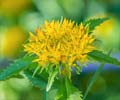Kenyan chemists are trying to develop malaria medicines from the extracts of plants.
The project, being carried out in the vicinity of the Mount Kenya, is a collaboration between traditional healers and plant chemists.Jack Githae, one of the traditional healers involved in the project, describes this work as ‘natural pharmacy’.
He has revealed that there are plants in the area that he often uses to treat patients suffering from malaria.
He, nowadays, sends samples of such plants to the Kenya Medical Research Institute (KEMRI) in the country's capital Nairobi, so that studies on them may pave the way for the next malaria wonderdrug.
The samples are tested at the institute's Centre for Traditional Medicine and Drug Research by a team of researchers led by Geoffrey Rukunga.
The research team also holds consultations with botanists at Kenya's National Herbarium to ensure the plants are correctly classified.
Advertisement
While the researchers are hopeful of achieving promising results from their work, Githae is surprised that no success has been made by the investigators as yet.
Advertisement
Rukunga has revealed that each plant component is tested in the laboratory for its ability to kill the malaria parasite. If any of them shows some promising results, it is tested on animals infected with malaria, he says.
The researcher has also revealed that any compounds that kill 75 per cent of the parasites in an animal, but leave human cells unaffected, are likely to be classified as a 'lead compound', a molecule that could potentially be turned into a drug.
Only five of the plant-derived compounds have been tested on animals so far, but they have failed to kill 75 per cent of the parasites.
Source-ANI
KAR/M










